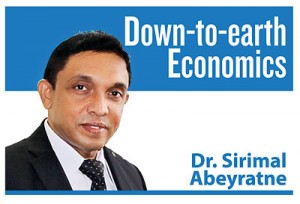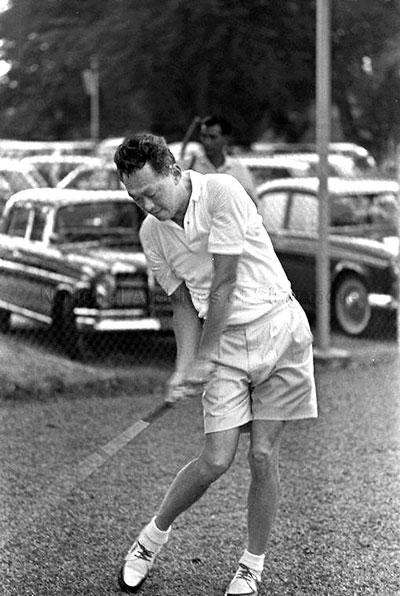Grazing in the Golf Course
View(s):Many Sri Lankans are familiar with the name Lee Kuan Yew, the late Prime Minister of Singapore who elevated that country from Third World to the First World status within a period of two decades. With a per capita income of over US$ 50,000 today, Singapore has surpassed even Japan and become the richest country in Asia.
Lee Kuan Yew’s references to Sri Lanka
Many Sri Lankans have another reason to remember his name. I have heard many Sri Lankans saying that Lee Kuan Yew desired to transform Singapore to be like Sri Lanka. I could not find any evidence to confirm the authenticity of this statement. Rather what I found was that he never wanted to do that. Why do I have to say that?
He used to be a frequent visitor to Sri Lanka long before he became the Prime Minster of Singapore. He has associated with most of political leaders and heads of the state beginning from the late Prime Minister S.W.R.D. Bandaranaike until his daughter the former President Chandrika Bandaranaike Kumaratunga. After all, he has made his remarks about most of these leaders and their policies and politics as he recorded in his book titled The Singapore Story. Anyone who reads these remarks would realise that Lee Kuan Yew never wanted to make Singapore to be like Sri Lanka; in fact, as I understood he learned from Sri Lanka not to make those mistakes ever in Singapore. This is very clear when you compare what he mentioned about Sri Lanka and, thereafter what he did in Singapore.
After seeing Colombo in 1956 for the first time, however he admitted that Sri Lanka was more prosperous than Singapore: “. Ceylon had more resources and better infrastructure than Singapore” as he mentioned in his the book – The Singapore Story. Lee Kuan Yew has recorded his observations in a simple fascinating language; but they all showed profound truth of the post-independent policy and political failure of Sri Lanka.
Losing its international position
Following is one of his remarks about Sri Lanka from his book The Singapore Story [page 462]: “In October 1966, on my way back from a prime ministers’ conference in London, I visited Colombo to meet Prime Minister Dudley Senanayake. He was a gentle if resigned and fatalistic elderly man. When we played golf on the former Royal Colombo golf course, he apologised for the encroaching squatter huts and the goats and cows on the fairway. He said it was inevitable with democracy and elections.”
Before we turn to the crux of the matter in this quotation, what was interesting to me was how he visited Sri Lanka – that is on his way back from London. This means that even by the mid-1960s Colombo Airport (Ratmalana) was an important aviation hub in the Asian region where the air travel passengers between the East and the West find their connecting flights. This is confirmed by even the first visit of Lee Kuan Yew where he mentioned, “My first visit to Sri Lanka was in April 1956 on my way to London.” How pathetic it was that Colombo subsequently lost its aviation hub status to Singapore itself and some other locations in Asia.
As Lee Kuan Yew remarked again, 12 years later in 1978, the then President J.R. Jayewardene requested his help to build AirLanka like Singapore Airline to be a symbol of national progress. Although he responded to the request favourably, President Jayewardene’s desire to build AirLanka as a commercially viable national carrier never materialised to this date.
Losing the Rule of Law
The ‘during golf’ quotation shows Prime Minister Dudley Senanayake’s attribution of state failure to democracy and elections. Does it mean that for a country with democracy and elections there is no hope? Does democracy and elections allow everybody to grab as per their own vested interests in the lush pastures of a golf course?

A 1966 picture of Singapore Premier Leel Kuan Yew playing golf, courtesy the National Archives of Singapore
The issue is, however, “rule of law”. Everybody from top to bottom can do whichever they like to do because there is no authority of the law. Rule of law implies two things: enforcement and impartiality. There is law enforcement so that laws are active and effective; for instance, if rules of the road are enforced, then there should be road discipline. The second is that there is law impartiality so that no one is above the law; for instance, the traffic police would have the full capacity to act the same way when anyone who violates the rules of the road regardless of who he is.
There cannot be “privileged” people who enjoy special favours from law-enforcement authorities.
Why is the rule of law important for the economy? Rule of law establishes a disciplined society. Freedom has boundaries whether it is political freedom or economic freedom or any other. These boundaries are defined by the rule of law. If someone’s freedom encroaches on another’s right, the rule of law should not allow the crossing of the boundaries.
The free market works for good only if there is discipline set by the rule of law. Proponents of free market look ridiculous when they forget this.
Opponents of free market look intelligent when they ignore this. Economic freedom is the character of free market founded on the rule of law.
There is no use of laws and regulations which are passed by the authorities and are written on documents, when they are not enforced. In fact, it is more harmful than having no rules and regulations because on the one hand the public gets used to disregard them knowing what they do is wrong. On the other hand, it would be costly for anyone who regards rules and regulations when others disregard them. What we tolerate is what we sustain.
Decay of prosperity
By the way, during this visit Lee Kuan Yew’s remarks about decaying Sri Lankan prosperity were not yet over. After this event, he went to Nuwara Eliya by train (not by a helicopter). This is what happened thereafter:
“It was a most instructive lesson on what had happened after independence (in Sri Lanka). The food on the train (in a special carriage) was poisonous.
The crab was badly contaminated and stank. I went immediately to the toilet and spewed it all out. This saved me. In Nuwara Eliya, I stayed at the former British governor’s hill residence, “The Lodge”. It was dilapidated.
Once upon a time it must have been well-maintained, with roses (still some left) in the garden that looked like an English woodland. About 5,000 feet above sea level, it was pleasantly cool. I played golf on a once beautiful course; like the one in Colombo, this also was encroached upon by huts, goats and cows.”
Today, 40 years later after this event, how do we make an independent assessment about the issue of the golf course? Though Sri Lanka has even bigger potential ahead and greater advantages intact, many fail to see that bigger picture. Their little aspirations are focused on how to grab a portion from the golf course for grazing. It is the freedom to grab, misinterpreted in the absence of the rule of law.
(The writer of this weekly column in the Business Times dealing with economic issues is Professor of Economics at the Colombo University)


